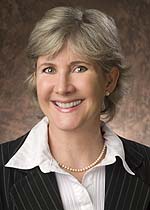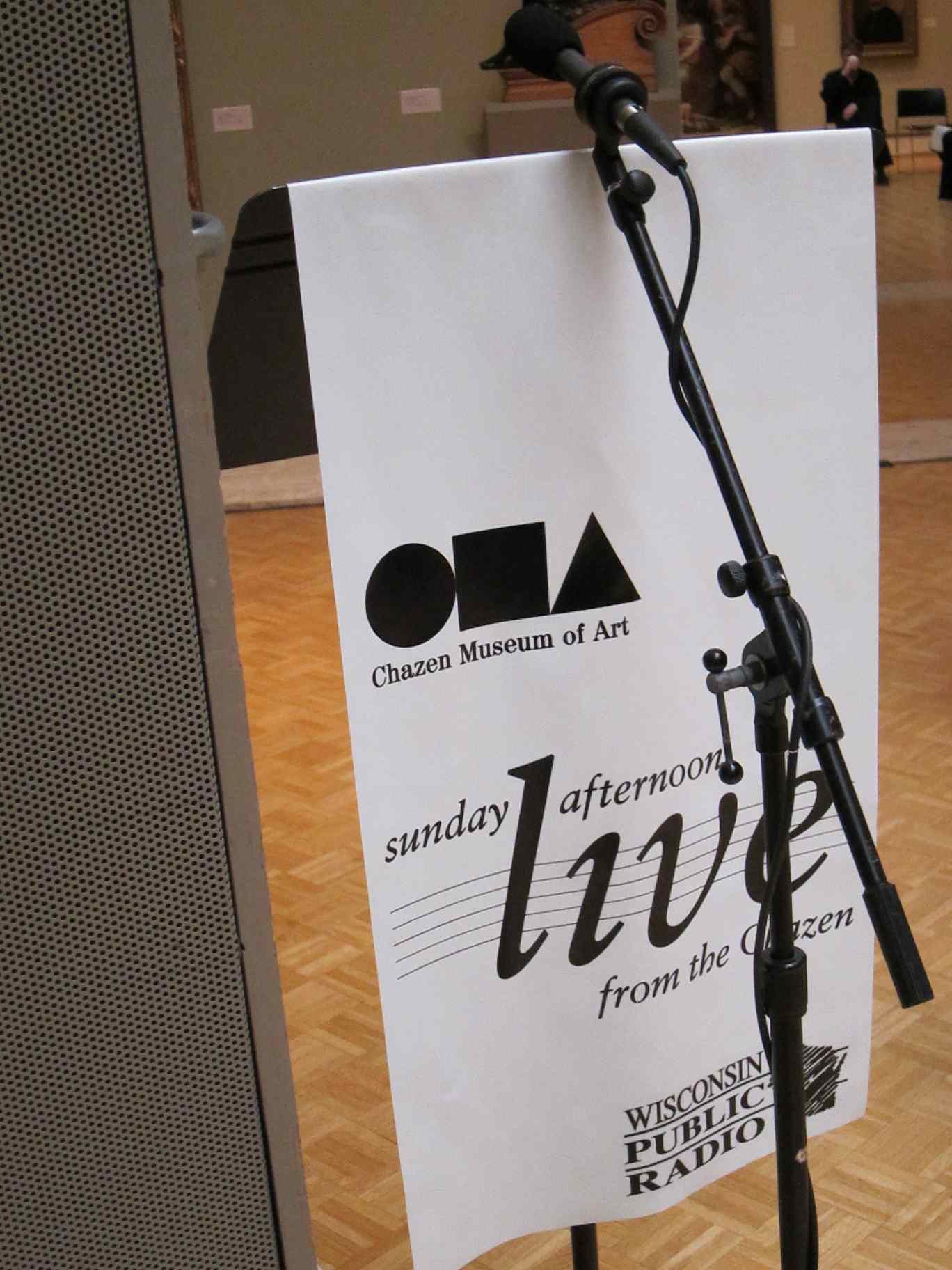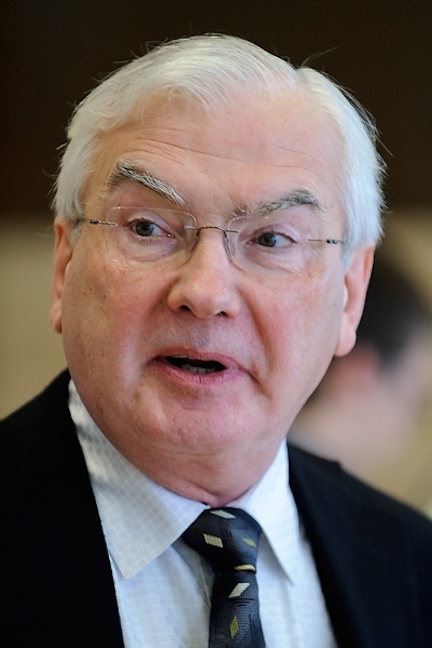The Well-Tempered Ear
Classical music: The Madison Symphony Orchestra’s 10th anniversary FREE “Final Forte” concert of young concerto winners is this Friday at 7 p.m. in Overture Hall. It will also be broadcast live by Wisconsin Public Radio and rebroadcast by Wisconsin Public Television.
1 Comment
By Jacob Stockinger
It is described as “Wisconsin Young Artists Compete.”
“The Final Forte” event is the final round of the Bolz Young Artist Competition in which the four finalists perform in a FREE concert with the Madison Symphony Orchestra that is broadcast live by Wisconsin Public Radio (WPR) and rebroadcast by Wisconsin Public Television (WPT).
“The Final Forte” will take place this Friday night at 7 p.m. in Overture Hall of the Overture Center. Seating is FREE but you must register with the Madison Symphony Orchestra. John DeMain will conduct the Madison Symphony Orchestra.
According to the Madison Symphony Orchestra, which organizes and conducts the competition:
“The Final Forte 2016 finalists (above) were selected from several young Wisconsin artists who competed in the Bolz Young Artist Competition’s two preliminary rounds. The event gave these four artists the chance to perform a movement from a concerto with the MSO.
The 2016 contestants are (below, left to right): Pianist Audrianna Wu of Madison, who will perform the third movement of the Piano Concerto in A minor by Edvard Grieg (you can hearing the famous concerto played by Norwegian pianist Leif Ove Andsnes in a YouTube video at the bottom); pianist Liam Mayo of Green Bay, who will perform the first and third movement of the Piano Concerto No. 1 by German composer Felix Mendelssohn; violinist Tabby Rhee of Brookfield, who will perform the first movement of the Violin Concerto by Finnish composer Jean Sibelius; and marimbist Robert Rockman of Sun Prairie, who will perform the “Fantasy on Japanese Prints” by American composer Alan Hovhaness.
This year’s anniversary event features special guest co-host, concert pianist Christopher O’Riley, who hosts NPR’s “From the Top” that airs here on Sunday night 8-9 p.m.
The most comprehensive information about the FREE concert, the live broadcasts, the biographies the four young contestants, the complete list of sponsors and a link to register to reserve a seat (you can also call 608 257-3734) can be found at the Madison Symphony Orchestra’s website:
http://www.madisonsymphony.org/finalforte
According to the MSO: “This competition has captured an enormous following and numerous honors, including an Emmy nomination, First Place in the “Special Interest” category from the Wisconsin Broadcasters Association in 2007, and fifth most-watched program in the February 2007 Nielsen ratings.
The 2008 WPT and WPR broadcasts reached more than 60,000 viewers and listeners in the Madison market alone and the 2009 broadcasts reached an estimated 200,000 statewide.”
This event will be broadcast on: Wisconsin Public Television: Tuesday, Feb. 2, at 8 p.m. and Sunday, Feb. 7, at 12 p.m.
Milwaukee Public Television: Friday, Feb. 5, at 8 p.m. and Tuesday, Feb. 9, at 4 a.m.
Wisconsin Public Radio: Sunday, Jan. 31, at 12:30 p.m.
Here is a link to Wisconsin Public Television, which features introductory videos about each performer:
And here is a link to Wisconsin Public Radio, where Thursday right after the noon news on The Midday, Christopher O’Riley, host of NPR’s popular classical music program From The Top, chats with radio host Stephanie Elkins (below) about his show and the young musicians from Wisconsin that have appeared on his show in the past. O’Riley is in town to help celebrate the 10th anniversary of the Bolz Young Artists Final Forte.
http://www.wpr.org/search/site/final%20forte
Tags: America, American music, artist, Arts, audio-video, Broadcast, Brookfield, Christopher O'Riley, Classical music, concerto, Emmy, fantasy, Final Forte, Finland, Finnish, From The Top, Germany, Green Bay, Grieg, Hovhaness, Jacob Stockinger, Japan, Japanese prints, Jean Sibelius, John DeMain, Leif Ove Andsnes, Madison, Madison Symphony Orchestra, marimba, Mendelssohn, Milwaukee, Music, National Public Radio, Nielsen, Norway, NPR, Orchestra, Overture Center, Piano, Piano concerto, Public broadcasting, Radio, Student, Sun Prairie, Television, TV, United States, University of Wisconsin-Madison School of Music, University of Wisconsin–Madison, video, Violin, Violin concerto, Wisconsin, wisconsin public radio, Wisconsin Public Television, WPR, WPT, YouTube
Classical music news: Wisconsin Public Radio has cancelled the “Sunday Afternoon Live From the Chazen” FREE chamber music series after 36 years of success. Other classical music from around Wisconsin is slated to replace it starting this fall.
29 Comments
PLEASE NOTE: Some corrections have been made from the original posting. I have noted them below in an updated version. I apologize for any inaccuracies, although the basic points remain the same.
By Jacob Stockinger
This Sunday’s edition of “Sunday Afternoon Live From the Chazen” will mark not just the end of the current season; it will also mark the end, after 36 years, of the FREE chamber music series that has been broadcast live by Wisconsin Public Radio throughout the state.
(Below is the Pro Arte Quartet, frequent guest performers who always attract a full-house at SAL.)
The concert series, which now reaches some 200,000 listeners across Wisconsin, will simply no longer exist. (NOTE: Potter says the actual figure is closer to 10,000, but that serving statewide listeners and not accumulating higher ratings is the motivation behind the change.)
Pianist Eugene Alcalay (below), who teaches at the University of Wisconsin-Platteville, will close out the series with a solo recital of Schubert, Beethoven and Wagner, broadcast live as usual, on this Sunday from 12:30 to 2 p.m. in Brittingham Gallery 3 of the Chazen Museum of Art on the University of Wisconsin-Madison campus, where it has attracted a full house almost every week.
(You can hear Eugene Alcalay play the first movement of the Sonata No. 2 in B-Flat Minor, “Funeral March,” Op. 35, by Frederic Chopin in a 2011 performance at the Chazen in a YouTube video at the bottom.) In the Madison area, you can hear it at WHA FM 88.7.
“This will be the last concert in that series for this season and forever,” said Wisconsin Public Radio’s Director of Marketing Jeffrey Potter.
The news comes just after WPR finished its successful spring pledge drive.
“The making of the decision and the timing of announcing it was not easy for us,” Potter told The Ear in a telephone interview on Wednesday afternoon.
Potter also said that the decision to cancel the series was the decision solely of WPR, and not of the Chazen Museum of Art officials, although he said they understood the reasons and appreciated being kept in the loop.
Potter said the decision should not be interpreted as a sign of failure of the SAL series that started in 1978.
“The most important message to get out is that it has been a great run,” Potters said, praising the audiences, the musicians, the venue and WPR’s longtime host Lori Skelton (below).
“It hasn’t been that there is something wrong with the program,” Potter said. “It is just that Wisconsin Public Radio is also looking out for the best way to serve the public because we are the single biggest presenter of classical music in the state. We want to highlight music in Green Bay, Superior, Milwaukee, Lawrence University in Appleton, even Mills Hall at the UW-Madison.” He added that doing that would serve the Wisconsin Idea — that the borders of the university are the borders of the state — as well or even better than the current “Sunday Afternoon Live.”
“The resources we put into a live broadcast are not insignificant,” Potter said. “Live music may be exciting, but being live music doesn’t determine whether it is great music or not.”
Potter said that other forms of classical music besides chamber music, in a format yet to be determined, will replace SAL in the fall. That programming will be done by SAL host Lori Skelton working with Peter Bryant, WPR’s new director of News and Classical Music Service Peter Bryant.
The emphasis, Potter said, will be on recorded music from around the state rather than on live performances in Madison by musicians from around the state.
In the meantime, WPR will follow the usual summer format. Performances by the Madison Opera’s productions of Puccini’s “Tosca” (May 17) and Jake Heggie’s “Dead Man Walking” (May 24) will occupy the next two Saturday (NOT Sunday, as Potter originally stated) afternoon time slots, starting the weekend after the live broadcasts from the Metropolitan Opera end.
Potter also said the WPR would be contacting musicians (NOTE: a letter was sent to them and to the Chazen officials on Wednesday, according to Potter) and the public about the program change in the near future, starting this week and weekend. More information will soon be posted on the website www.wpr.org
NOTE: Adds Potter on Thursday: “I wanted to share the link with additional details about the decision. It can be found on the home page, right side middle of the page under the “Announcements” section. Here’s the link: http://www.wpr.org/news-about-wprs-sunday-afternoon-live-chazen
The decision to cancel “Sunday Afternoon Live From the Chazen” was met with disappointment and disapproval by Russell Panczenko, the longtime director of the Chazen Museum of Art.
“I was caught completely by surprise,” said Panczenko (below). “Frankly, I knew nothing about it,” he added saying he was disappointed because killing off the series would lower the profile of the free public museum statewide.
“A year ago said they thought might be doing something, but then at a meeting this spring where I thought they would just be discussing the next season, they came out of the blue and said they were canceling it,” Panczenko explained. “They just cancelled, no discussion.”
“I always thought it was wonderful program, not just for us but also for the people who went into the galleries after the concerts,” Panczenko added. “People also heard about the museum around the state because there was always a 7-minute promotion piece about the touring or permanent exhibitions. I thought it was a good deal all around. It was wonderful. It was the also the only live performances they regularly had.”
Both Potter and Panczenko said they anticipated negative reactions and backlash from the public. But, Potter said, that is unlikely to change the decision, as happened when WPR tried to cancel live broadcasts on Saturdays from the Metropolitan Opera and tried to change Classics by Request from Saturday to Friday, then rescinded each decision.
“Anytime you have a program change and lose something, it is hard on people,” said Potter, who added that WPR gets about 36,000 emails and phone calls about programming each year.
“I don’t think we will reverse this decision despite opposition” said Potter. “We are really trying to look at the bigger picture. We want to hear opposition. But we didn’t enter in this lightly and we wouldn’t exit it lightly.”
But Potter said he wanted the public to know that the change will not lessen the amount of classical music that will be heard on WPR,
Said Potter: “We at WPR remain committed to serving our customers throughout the state. We feel that people will continue to enjoy classical music on WPR.”
If you want to leave a public opinion or statement, please use the COMMENTS section of this blog.
And don’t forget that you can copy and paste from comments to private emails and vice-versa.
Here are some contact email addresses to send WPR a message:
Director of Radio: mike.crane@wpr.org
Director of News and Classical Music Service: peter.bryant@wpr.org
Director of Marketing: jeffrey.potter@wpr.org
Listeners or musician or even performer, what do you think about Wisconsin Public Radio killing off “Sunday Afternoon Live From the Chazen”?
The Ear wants to hear.
Tags: Appleton, Arts, Chamber music, Chazen Museum of Art, Chopin, Classical music, Eugene Alcalay, Frédéric Chopin, Funeral March Sonata, Green Bay, Jacob Stockinger, Jake Heggie, Lawrence University, Madison, Madison Opera, Metropolitan Opera, Milwaukee, Music, opera, Panczenko, Pro Arte Quartet, Russell Panczenko, Sunday Afternoon Live From the Chazen, Superior, The Wisconsin Idea, University of Wisconsin-Madison School of Music, University of Wisconsin-Platteville, University of Wisconsin–Madison, Wisconsin, Wisconsin Idea, wisconsin public radio, WPR, YouTube
Classical music: What classical music goes best with Super Bowl 47 today since there are fewer live concerts to attend that conflict with the football game?
11 Comments
By Jacob Stockinger
Today is Super Bowl Day.
Can you believe that tickets average $3,500?
Anyway, for Super Bowl 47 today in New Orleans — between the Baltimore Ravens and the San Francisco 49ers — it seems like a lot of local music groups have learned the lessons of past years and not scheduled live concerts that conflict with the popular sports event.
Even if the Green Bay Packers aren’t playing in this year’s championship game –- which will start with a 5:30 p.m. CST kickoff on CBS tonight and can be watched on TV or streamed live on the CBS sports web site –- preventing or avoiding the loss of audiences to other events seems a wise choice.
So The Ear asks: Can you name a good classical piece that goes well with the Super Bowl?
Here is some of Aram Khachaturian’s score for the ballet “Spartacus” that seems to capture the right combative spirit:
And maybe Gustav Holst’s popular and dramatic “Mars – The Bringer of War” from his tone poem suite “The Planets” is another appropriate choice.
Can you name other works that capture the same spirit?
Let me know in the COMMENT section, preferably with a link to a YouTube video.
I will appreciate it for this year – and I expect in future years, when maybe Green Bay will appear again.
And win.



















